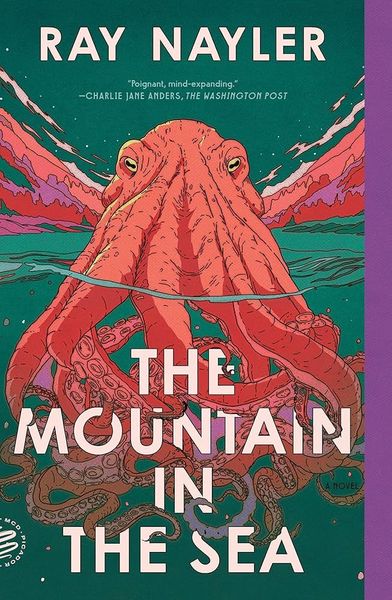
The Mountain in the Sea A Novel
Debut novelist Ray Nayler has written one of the most masterful science fiction novels to come along in some time. This near-future thriller takes place mostly on an archipelago off the coast of Vietnam, where a species of octopus appears to be developing culture. A multinational tech company has purchased and sealed off the islands for further study, and Dr. Ha Nguyen is there to research the creatures. There are others on the team, including Evrim, who is the first humanoid artificial intelligence to have been created, and indeed every character in this novel adds substantially to the story. I’ll be honest: I felt like this book broke my brain several times. It’s just so profound and well written. Ultimately, it’s a study of culture, language, consciousness, and the nature of intelligence, as well as a rumination on ambition and how we treat the world. It’s lyrical and thoughtful, and I'll immediately pick up the next Ray Nayler novel as soon as it’s available. —Chris Schluep, Amazon Editor
Reviews
Katelyn Caillouet@hellokatelyn
abi a@abiblu
julia@juliwaves
Katy Watkins@katy
claire@calorie
Jay Harris@jayharris
Emiley Jones@emileyjones
Brett Seybert@brseybert
Quinnie@ghostkingsss
Laura@laura-itw
Thi Chinh@thichinh
Ridwan Alim Muhaimin@ridwanmhn
Brian Alderman@brianaalderman
Gonia Cholewa@coconuthooves
Jovanna Briscoe @jobrisk
Jeanne L Collier@jeannelynne24
Thomas@tomlinde
Chris Mock@thechrismock
Jason Pinto@jasonpinto
Heath@backpacking_tortoise
Annabelle Gauthier@annagoatcheese
Graham@anagraham
Adam@looptem
anna g@greenbeanseason
Highlights
abi a@abiblu
Page 45
Katy Watkins@katy
Giovanni Silva@wamblyreader
Page 287
Giovanni Silva@wamblyreader
Page 287
Giovanni Silva@wamblyreader
Page 286
Giovanni Silva@wamblyreader
Page 271
Giovanni Silva@wamblyreader
Page 267
Giovanni Silva@wamblyreader
Page 236
Giovanni Silva@wamblyreader
Page 235
Giovanni Silva@wamblyreader
Page 233
Giovanni Silva@wamblyreader
Page 231
Giovanni Silva@wamblyreader
Page 229
Giovanni Silva@wamblyreader
Giovanni Silva@wamblyreader
Page 227
Giovanni Silva@wamblyreader
Page 222
Giovanni Silva@wamblyreader
Page 211
Giovanni Silva@wamblyreader
Page 209
Giovanni Silva@wamblyreader
Page 204
Giovanni Silva@wamblyreader
Page 183
Giovanni Silva@wamblyreader
Page 167
Giovanni Silva@wamblyreader
Page 149
Giovanni Silva@wamblyreader
Page 111
Giovanni Silva@wamblyreader
Page 76
Giovanni Silva@wamblyreader
Page 73